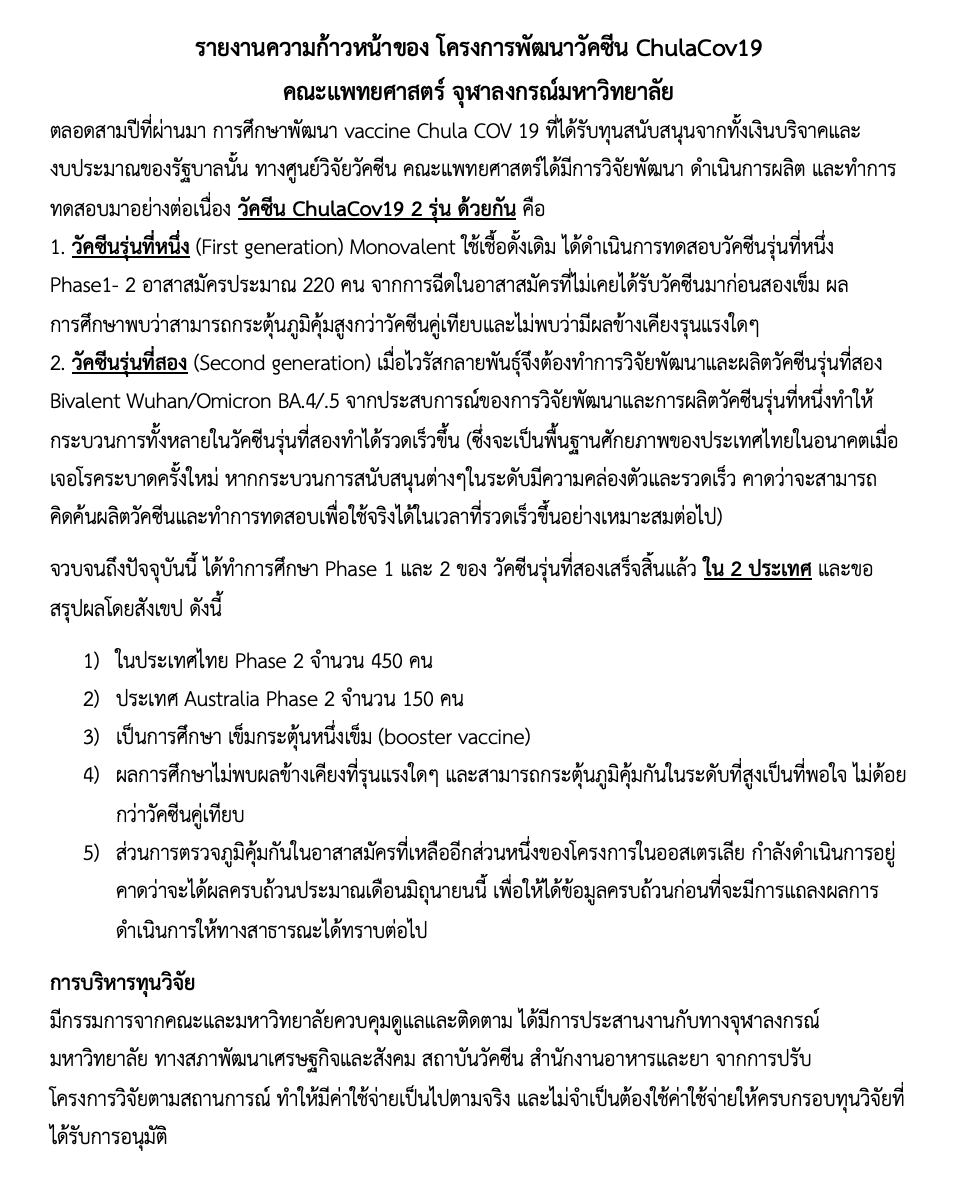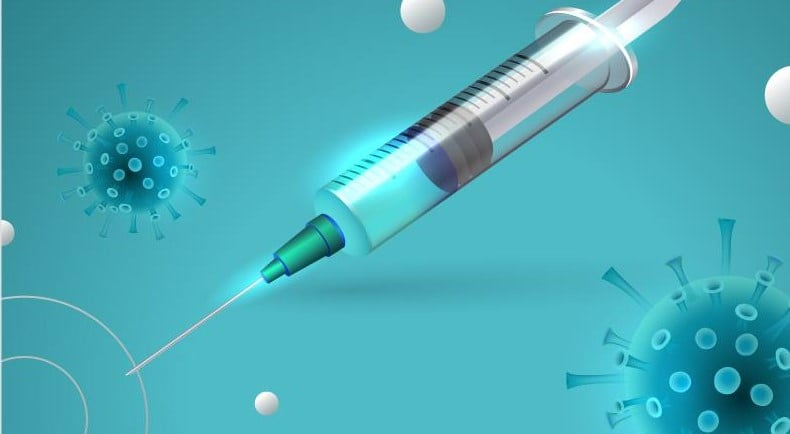Currently, the Vaccine Research Center, Faculty of Medicine, Chulalongkorn University, has joined as one of the important forces in the development of vaccine research against important pathogens in the Asian region, both with Vaccine R&D SEA of the World Health Organization and by the UK-SEA Vax Manufacturing Research Hub and the University of Sheffield, UK It is expected that by next year 2025 there will be at least 1 type of vaccine that has been developed or co-developed and will be further tested in volunteers.
May 6, 2024 – Chulalongkorn University Faculty of Medicine press release Summary of the progress report “ChulaCov19 Vaccine Development Project” as of May 3, 2024, for the past three years The Chula COV 19 vaccine development study was funded by both grants and government budget. The Vaccine Research Center The Faculty of Medicine has research and development. Continue with continuous production and testing
There are 2 models in the development of the ChulaCov19 vaccine, in which 1. Monovalent vaccine of the first generation using the original vaccine. Phase 1-2 of the first generation vaccine was tested on approximately 220 volunteers by injecting two doses of the vaccine into volunteers who had never received the vaccine before. The results of the study showed that it was able to induce higher immunity than comparable vaccines and did not detect any adverse effects. And 2. Second generation vaccines: When the virus changes, it is necessary to research, develop and produce second generation vaccines. Two bilateral Wuhan
Based on experience in research, development, and production of first-generation vaccines, many processes in second-generation vaccines can be made faster. This will form the basis of Thailand’s future capacity when there is a new pandemic. If the various support processes are flexible and fast it is expected that vaccines will be created and tested for real use in a timely manner.
Currently, phase 1 and 2 studies of the second generation vaccine have been completed in two countries and the results are summarized as follows: 1. In Thailand, Phase 2, 450 people 2. Australia, Phase 2, 150 people are studying. One booster injection (booster vaccine) 4. The study results found no adverse effects. and can stimulate the immune system at a satisfactory high level Not lower than comparable vaccines and 5. The other part of the volunteer immune system test is part of the project in Australia. It is currently underway and is expected to have complete results around June. To obtain complete information before the results of operations are announced to the public.
In managing research funds, there are committees from the faculty and the university to monitor and follow them. There has been coordination with Chulalongkorn University. Council for Economic and Social Development, Immunization Institute, Food and Drug Administration (FDA) from changing research projects according to the situation. Make reasonable and unnecessary expenses to complete the approved research grant framework.
As an important reason, the faculty and the university decided not to proceed with the third level and registration. and he has returned 1,700 million baht to the government from the 2,300 million baht that the government approved. Even though the ChulaCov19 vaccine, both version 1 and version 2, is effective in stimulating immunity. And there were no side effects at all. A summary of the important reasons follows:
1. Need for use COVID vaccines have declined significantly. As most people have received at least two doses of the vaccine and have developed disease and natural immunity, international and national vaccination recommendations have changed, namely people younger than 75 years ‘ age and without chronic diseases, there is no need for annual vaccinations. Therefore, the demand for vaccines at the national level has decreased. and the lack of need for the product in the country Instead, focus on developing other essential vaccines.
2. 2nd generation vaccine if registered It does not answer the question. Current Structure Educational plans are adapted to unpredictable circumstances, such as the nature of events. the severity of the disease
3. Now Thailand is confirmed. Potential capabilities and research and development capabilities of the medical team and Thai vaccine production factories Ready for action quickly To face the next disease and can develop other vaccines necessary for disease prevention and treatment another. Currently, several types are being treated, including a vaccine to treat breast cancer from HPV, a dengue fever vaccine, and a leptospirosis vaccine. and bird flu vaccines to prepare before outbreaks, etc.
For the long-term plan and direction of vaccine research and development, the Faculty is committed to building the capacity and capability to lead ongoing vaccine development from past grants and investments from the faculty and the a hospital. as well as government research funds Join international efforts to make effective and safe vaccines for the prevention and treatment of important diseases accessible to the majority of people in Thailand and as many low-income countries as possible and moderate. both diseases that occur continuously and in the case of future epidemics
Currently, the Vaccine Research Center, Faculty of Medicine, Chulalongkorn University, has joined as one of the important forces in the development of vaccine research against important pathogens in the Asian region, both with Vaccine R&D SEA of the World Health Organization and by the UK-SEA Vax manufacturing research Hub and the University of Sheffield, UK It is expected that there will be at least 1 type of vaccine developed or co-developed by next year 2025 and will be further tested in volunteers.

2024-05-06 07:45:15
#Chula #medical #team #explains #stopped #developing #Covid #vaccine #ChulaCov19 #Stage #deciding #return #million #baht #government



